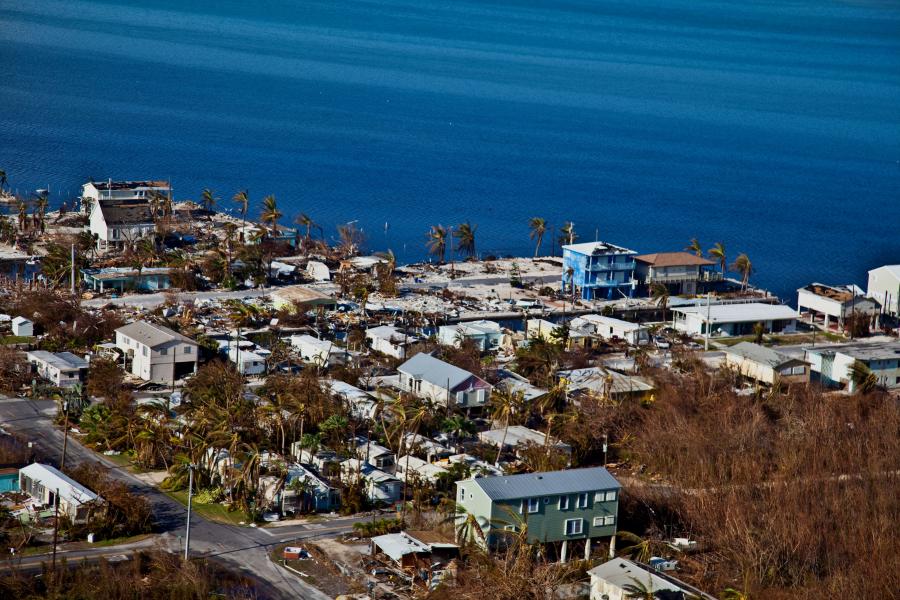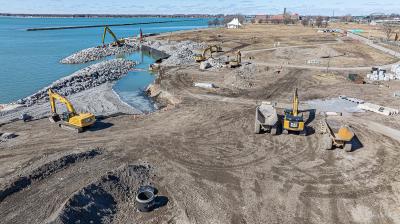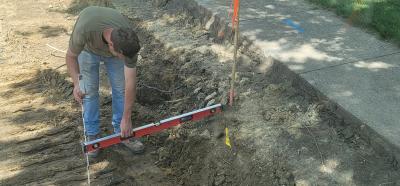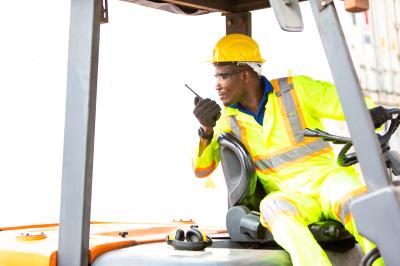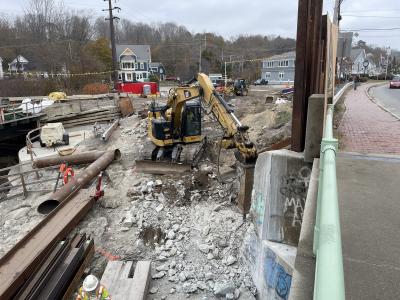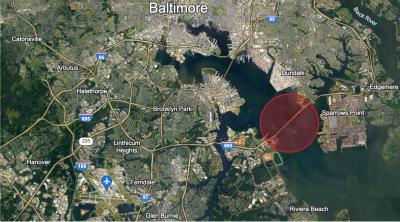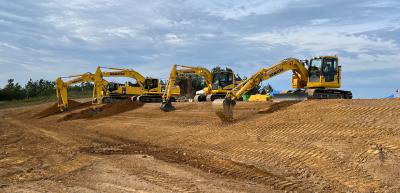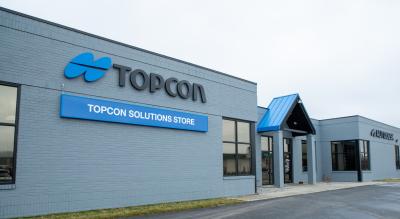A route clearance team of the Florida National Guard’s Chemical Biological Radiological Nuclear Emergency Response Force-Package search several vessels shipwrecked by Hurricane Irma and left abandoned along the shoreline at Naval Air Station Key West.
Only twice in United States history have two major Hurricanes made landfall back-to-back on the mainland, according to the National Hurricane Center.
Over the past few weeks, Hurricanes Harvey and Irma brought that number up to three. On Aug. 25, Harvey made landfall and devastated southeast Texas, dumping more than 50 inches of rain with maximum sustained wind gusts reaching 130 mph. While it may take weeks to determine the exact death toll, Texas officials now believe at least 70 people lost their lives to the storm and subsequent flooding.
Surrounding states jumped into action to help Texans, including the Louisiana DOT, which donated busses and other resources to evacuate those along the Texas/Louisiana border beginning on Aug 30. Local businesses also came to the aid of victims, including several construction equipment dealers and manufacturers — Nueces Power Equipment, Mustang Cat, LiuGong/Dressta and more. But even as these rescue and relief efforts were taking place, meteorologists were predicting a new event that would impact the Southeast — Hurricane Irma.
Hurricane Irma Eyes the Caribbean and the Keys
As Irma worked its way through the Caribbean, it strengthened in intensity to a Category 5 hurricane, and, on Sept. 6, the U.S. Virgin Islands reported wind gusts of 110 mph. Puerto Rico also reported high winds totaling 185 mph.
Just a day before, Gov. Rick Scott of Florida suspended all tolls across state highways to facilitate the evacuation of its citizens, and, on Sept. 7, hurricane surge and storm warnings were issued for Florida. Many communities struggled to carry out the evacuation, including Miami-Dade County, which proved to be the largest evacuation in the county's history.
Hurricane Irma made landfall in the United States Sept.10 in the lower Florida Keys as a Category 4 hurricane with 130 mph wind gusts. As it continued, the storm weakened to a Category 3 hurricane with 120 mph gusts. FEMA currently estimates that 25 percent of the homes in the Florida Keys were destroyed and 65 percent sustained major damage.
After pelting the Keys, Irma was downgraded to a tropical storm; however, that didn't prevent the storm from making a dramatic show of its power — toppling two cranes in downtown Miami. The damage could have been much worse; there are more than two dozen cranes erected in Miami with counterbalances weighing up to 30,000 lbs., according to the Associated Press. Due to their size and scope, crews did not have enough time to move the cranes before the storm hit Miami.
As Irma worked its way up the state of Florida, it brought high winds and flooding in its wake. Jacksonville, Fla., experienced record-setting flooding from St. Johns River, and on Sept. 11, the Jacksonville Sheriff's Office's warned citizens via Twitter to evacuate zones along river. Water levels ultimately reached 60 in., surpassing the previous record set by Hurricane Dora by 10 in., according to the National Hurricane Center.
Local Equipment Dealers Lend Assistance
Just as they had in Texas, local construction equipment dealers stepped up to do their part to help their communities recover from the storm — even as they were continuing to recover themselves.
Michael Vazquez, vice president of Meco Miami, said that around half of his employees still did not have electricity as of Sept. 14, but that didn't stop them from volunteering their time and expertise to help those in need.
“Some of my employees have donated their time through the United Way, Red Cross and local churches to help people in need,” said Vazquez. “Two of my employees live in apartments and had no damage, so they were able to help. No one worked on Monday [Sept. 11] so several of our employees donated their time to transport and help those in need.”
Overall, Vazquez said that they were very fortunate to have been spared the brunt of the storm. He said preparations began on Sept. 4, securing lighter equipment that would be vulnerable to damage or become a projectile in high winds. The company's larger equipment was used in another way.
“We have about 200 machines, so we put the larger equipment all the way around the facility,” he said. “That way if something did become airborne, we would protect the facility as much as possible. The equipment we have — the large loaders, SANY excavators, Dynapac equipment — they all weigh between 20 and 40,000 lbs. They cannot be moved by the wind.”
These precautions paid off for the company.
“We were very fortunate. We had a metal protection wall that we use for our wash base that blew off and we had a tree go down, but overall we had very minimal damage to our facility. We have a tower crane that is 100 ft. tall and didn't have any trouble with it at all.”
Now that the storm has passed, Vazquez said a variety of equipment will be going out to aid the recovery effort, including front end loaders, backhoes, skid steers, generators and light towers. He also said man lifts will be used to reach electrical cables, as well as sweepers to clean the streets.
“As of today [Sept. 14], I believe the contracts are going to be awarded. I have about 17 machines on hold for contractors I work with on a daily basis that are waiting to see if they will get a job. We are waiting to see — literally within an hour or so — who will be awarded which jobs. We do have equipment in the first phase trying to clean up some streets on the private sector side. It's basically contractors who got the machines to clean up residential streets in neighborhoods in larger areas. We started that on Monday [Sept. 11] as a matter of fact.”
John Roseberry, sales manager of Great Southern Equipment, also said his company and its employees are ready to help its customers.
“We are always available to help. I know most departments are running hard right now trying to take care of machines. Our sales guys are out taking care of the customers that have needs for equipment.
“One of our customers has done a lot of FEMA clean-up in the past; he has taken several pieces of equipment. As of this morning [Sept 20], we don't have any wheel loaders left, and we have one excavator left with a thumb on it. Everything going out is to existing customers that are doing clean-up work. A lot of the clean-up has been in south Fla., some in the Jacksonville area.”
According to Roseberry, the company has been largely spared from any major damage. He said aside from some water in its Jacksonville parts warehouse and some power outages, the company did not sustain any appreciable damage. Great Southern Equipment's headquarters facility is in Tampa, and it has additional locations in Orlando, Ft. Myers, Pompano Beach, Jacksonville, Tallahassee and Ocala.
“We started closing our stores Friday [Sept. 9] at noon the weekend before the storm hit, and we were also closed on Monday [Sept. 11], the storm came through Saturday and Sunday. To be honest with you, at the time, no one knew where the storm was going. One minute it's going to make a right-hand turn and then it's going to be a direct hit on Miami and the next thing you know it going to come up the west coast of Florida. It ended up coming up the center part of the state, so it was not the easiest thing to plan for. We did have some people evacuate, especially those in the Ft. Myers and Pompano Beach location. They all headed north.”
As of Sept 20, Roseberry said that operations are all but back to normal with the exception of one employee in the Miami area that doesn't have power.
Power Outages Wreak Havoc on Hillsborough County
In a news briefing on Sept. 11, Eric Silagy, president and chief executive of Florida Power & Light (FPL), said that more than half of the population of Florida was without power. These outages had obvious consequences for residents who had to deal with temperatures that topped 80 degrees in Miami and Tampa.
But as Win Blodgett, president of Holland Pump, pointed out, power outages also can wreak havoc on municipal services.
“Hillsborough county is facing a situation that many of the other municipalities with massive power outages are facing,” said Blodgett. “I was told they have 800 lift stations to handle the sewer/waste water systems throughout the county. Every neighborhood will have a lift station; every shopping center will have a lift station. The pumps that run those lift stations are generally electric pumps, so when you have a power outage, you either have to have a backup generator to run it, or you have to have a backup diesel pump to run it. However, my understanding is they don't have 800 dedicated gen sets they need for their lift stations, so they have to juggle their resources. They're relying heavily on the various pump rental companies to come in and help. We have competitors in this business, but right now we're all trying to work cooperatively together and deal with the problem and get people's lives back in order.”
Blodgett said that he is currently diverting 100 pumps as well as generators to help his customers in Hillsborough county and other areas affected by the storm.
“We transferred pumps from Pensacola, Jacksonville, West Palm Beach as well as Walterboro, S.C., in addition to brand new pumps directly from the factory to Hillsborough to help them with the current crisis. Collier County and Duval County in Jacksonville, at this moment, are not even in a state to deal with this because the flooding is so intense. They're still doing search and rescue, so they haven't gotten to the point where they have a plan of how to deal with the problem. I know Hillsborough is one county starting to take care of it.”
Further north, Josh Steele, corporate marketing manager of construction and forestry division of Flint Equipment, said power outages and flooding had affected their locations as well. The company's Brunswick, Ga., location had access issues due to flooding in the area, but didn't experience major interruptions to its operations. Its Savannah and Atlanta locations, however, experienced more serious issues.
“In Savannah, it's been more about the power outage and utilities more than anything,” said Steele. “We have other branches that have been affected. Here in Atlanta, we still don't have phones or internet [as of Sept. 13]. The Braselton location just got phones back.
“As of this morning [Sept. 13], Glen County still won't let residents back into the county; roads are still unpassable. The Brunswick location is still up in the air. Savannah of course is dependent on when they can restore power, phones and internet.”
Floridians Are Resilient
While many areas in Florida sustained severe damage, the Keys received the brunt of the hit.
“My understanding is the Keys will need a some time to come back,” said Blodgett. “Naples and Jacksonville had some devastating flooding as well. We have been helping citrus farmers in the Vero Beach region but in general I think we faired quite well in West Palm Beach. We had 60 to 75 mph winds for 12 hours, maybe among the longest of area in the state, but we didn't have super strong winds. We were on the East Coast, so we didn't get the storm surge that the West Coast did.”
“I've been really impressed with the state of Florida as a whole — how well prepared our citizens were. They really took this storm seriously. Maybe it's because Harvey had just happened. The people that needed to evacuate seemed to have evacuated for the most part. Businesses were well prepared. I thought the Governor did a great job. The state as a whole — all of the different organizations involved in the effort — did a super job.” Roseberry also had high praise for the state and its leadership
“Our governor Rick Scott did a phenomenal job of prepping everything,” said Roseberry. “President Trump certainly responded. My hat is really off to the power crews that came in from out of state. I know we had some lines down by one of the main roads near our subdivision and everybody working that was from Pennsylvania and they did a phenomenal job. The power crews and the tree guys did a great, great job of getting service back as quickly as they could.”
Vazquez reflected on the overall scope of the storm.
“First of all, it was the largest storm in recorded history,” said Vazquez. “The storm had gusts of wind up to 220 miles-per-hour; it was an enormous storm. It was the size of Ohio. The storm literally affected the whole state of Florida. We are very fortunate that it went to the west coast and it lost a lot of power, and by the time it got to Lakeland, it was already down to a Cat 1. Our biggest concern in Florida is definitely the Keys. We are very sad about what happened there. There is an enormous amount of loss. However, I personally think that with the resiliency of the people here in Florida, within a few months, most of the state will be back to normal and the Keys will be working toward normalcy.”
(This story also can be found on Construction Equipment Guide's website at www.constructionequipmentguide.com.) CEG
Today's top stories



